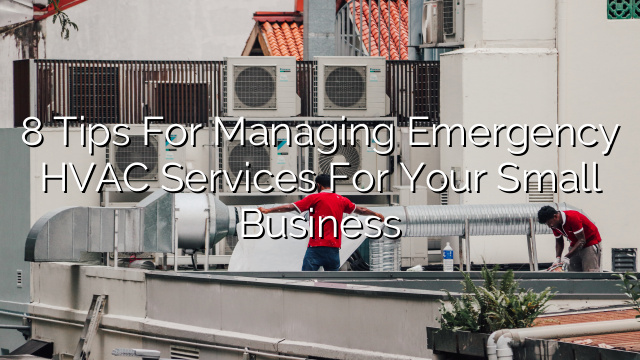Introduction
As a small business owner, dealing with unexpected HVAC issues can be a major headache. A malfunctioning heating or cooling system can negatively impact productivity, discomfort employees, and even drive away customers. To effectively manage emergency HVAC services for your small business, it is important to have a plan in place that includes proactive maintenance, regular inspections, and quick response times. In this blog post, we will provide you with 8 valuable tips to help you manage emergency HVAC services for your small business.
1. Conduct Regular Inspections and Maintenance
One of the best ways to prevent emergency HVAC situations is to conduct regular inspections and maintenance of your heating and cooling systems. This includes cleaning or replacing air filters, checking refrigerant levels, inspecting electrical connections, and ensuring proper airflow. Regular maintenance can help detect potential issues before they become major problems.
2. Find a Reliable HVAC Contractor
Having a trusted HVAC contractor that you can rely on for emergency services is crucial. Take the time to research and find a reputable contractor who offers 24/7 emergency HVAC services. Look for companies that have positive customer reviews and are licensed and insured.
3. Create an Emergency HVAC Contact List
Make sure you have a readily available list of emergency HVAC contacts. Include the contact information for your HVAC contractor as well as any other relevant emergency contacts. This list should be easily accessible to all staff members, particularly those responsible for facility management.
4. Train Your Staff
Train your staff on how to respond to emergency HVAC situations. Teach them how to identify common HVAC problems, how to shut off the system in case of an emergency, and who to contact for assistance. Having knowledgeable staff members can help minimize the impact of HVAC emergencies.
5. Invest in Monitoring Systems
Consider investing in HVAC monitoring systems that can detect and alert you to potential issues before they become emergencies. These systems can monitor temperature, humidity levels, and other variables to help you identify problems early on. By catching issues early, you can often avoid costly emergency repairs.
6. Have a Contingency Plan
Developing a contingency plan for HVAC emergencies is essential. This plan should outline the steps to take in the event of an HVAC emergency, such as who to contact, how to shut off the system, and any temporary solutions or backup options. Having a plan in place can help minimize downtime and ensure a quick response.
7. Keep Records of HVAC Maintenance and Repairs
It is important to keep detailed records of all HVAC maintenance and repairs. This includes dates of service, types of services performed, and any replacement parts used. These records can help you track the health of your HVAC systems, identify recurring problems, and provide documentation for warranty claims.
8. Schedule Regular HVAC System Upgrades
To avoid frequent emergencies, it is important to schedule regular HVAC system upgrades. This may involve replacing old equipment with more efficient models or implementing energy-saving technologies. Upgrading your HVAC system can not only improve performance but also reduce the likelihood of unexpected breakdowns.
FAQs
Q: How often should I schedule HVAC inspections?
A: It is recommended to schedule HVAC inspections at least twice a year – once before the hot season and once before the cold season. This will help ensure that your system is in working order and ready to handle the upcoming weather demands.
Q: Why is it important to hire a licensed HVAC contractor?
A: Hiring a licensed HVAC contractor ensures that the individual or company has met the necessary requirements and possesses the knowledge and skills to handle HVAC systems. It also provides you with protection and peace of mind knowing that you are working with qualified professionals.
Q: Can I perform HVAC maintenance myself?
A: While there are some HVAC maintenance tasks you can do yourself, such as changing air filters, it is generally recommended to hire a professional for more complex tasks. HVAC systems are intricate and require specialized knowledge and equipment for proper maintenance and repairs.
Q: How can I minimize the impact of HVAC emergencies on my small business?
A: By conducting regular inspections, investing in monitoring systems, and having a contingency plan in place, you can minimize the impact of HVAC emergencies. Additionally, training your staff on how to respond to emergencies and having a trusted HVAC contractor on call can help ensure a quick resolution.
Conclusion
Managing emergency HVAC services for your small business is a critical aspect of maintaining a comfortable and productive work environment. By following these 8 tips, you can proactively address HVAC issues, reduce the likelihood of emergencies, and ensure prompt resolutions when unexpected problems arise. Remember, preparedness is key to successfully managing emergency situations, so take the time to create a plan and enlist the help of trusted professionals.






